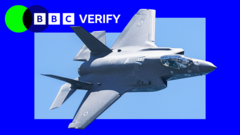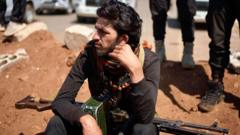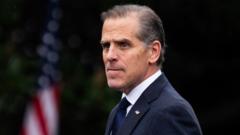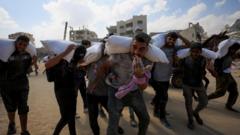An Iranian missile strike on the Soroka Medical Center in Beersheba has heightened tensions in the ongoing conflict between Israel and Iran. This incident has prompted Israel’s government to threaten increased military responses against Iranian strategic targets.
Rising Tensions: Iran Strikes Israeli Hospital, Prompting Response from Israel

Rising Tensions: Iran Strikes Israeli Hospital, Prompting Response from Israel
Iran targets a major Israeli hospital amidst escalating military conflict, resulting in Israeli threats to intensify retaliatory strikes.
The ongoing conflict between Israel and Iran has escalated dramatically following a missile strike that hit the Soroka Medical Center in Beersheba, southern Israel. The missile hit on Thursday afternoon as part of a larger barrage of attacks that have ensued since the war broke out last week, marking the first direct hit on an Israeli hospital in this conflict.
Israel's Defense Minister, Israel Katz, announced a decision to "remove the threats to the state of Israel" with an intensified military response targeting "strategic locations" within Iran. The Israeli military is reportedly conducting air strikes targeting Iranian nuclear facilities, emphasizing its determination to dismantle Tehran's nuclear program in light of the recent attacks.
The Soroka Medical Center reported sustaining “widespread damage” but noted that prior evacuations had minimized casualties. Alongside the hospital strike, Israeli sources confirm that at least 24 individuals in Israel have died due to Iranian missile attacks since fighting escalated, while the Iranian government claims that over 224 civilians have perished in retaliatory Israeli air strikes.
The situation remains tense with uncertainty looming over U.S. involvement. Controls are reportedly being instituted in Iran, including internet blackouts, possibly to prevent information dissemination about military operations. Resentment among the Iranian populace appears to be growing, with citizens expressing frustration over their plight amid external military actions and an ineffective government response.
As retaliation strategies are discussed openly, the exchange of missile strikes, civilian casualties, and the looming presence of U.S. military involvement is fostering a perilous environment in the Middle East. The stakes continue to rise, with each side preparing for a prolonged engagement that could escalate beyond their borders if international powers become involved.
Furthermore, efforts for diplomatic discussions arise as Iranian officials express willingness to meet with U.S. representatives under certain conditions, mirroring a need for resolution amid the catastrophic human toll from the ongoing conflict. Yet, the path to peace appears fraught with obstacles, not only from the military actions but also from deeply entrenched political positions on both sides.
Israel's Defense Minister, Israel Katz, announced a decision to "remove the threats to the state of Israel" with an intensified military response targeting "strategic locations" within Iran. The Israeli military is reportedly conducting air strikes targeting Iranian nuclear facilities, emphasizing its determination to dismantle Tehran's nuclear program in light of the recent attacks.
The Soroka Medical Center reported sustaining “widespread damage” but noted that prior evacuations had minimized casualties. Alongside the hospital strike, Israeli sources confirm that at least 24 individuals in Israel have died due to Iranian missile attacks since fighting escalated, while the Iranian government claims that over 224 civilians have perished in retaliatory Israeli air strikes.
The situation remains tense with uncertainty looming over U.S. involvement. Controls are reportedly being instituted in Iran, including internet blackouts, possibly to prevent information dissemination about military operations. Resentment among the Iranian populace appears to be growing, with citizens expressing frustration over their plight amid external military actions and an ineffective government response.
As retaliation strategies are discussed openly, the exchange of missile strikes, civilian casualties, and the looming presence of U.S. military involvement is fostering a perilous environment in the Middle East. The stakes continue to rise, with each side preparing for a prolonged engagement that could escalate beyond their borders if international powers become involved.
Furthermore, efforts for diplomatic discussions arise as Iranian officials express willingness to meet with U.S. representatives under certain conditions, mirroring a need for resolution amid the catastrophic human toll from the ongoing conflict. Yet, the path to peace appears fraught with obstacles, not only from the military actions but also from deeply entrenched political positions on both sides.



















